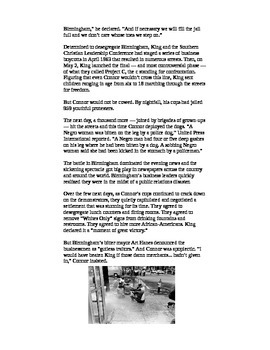

The initial aim of the eMargin project was to bridge the gap between two distinct approaches to textual analysis: the top-down, quantitative approach of corpus linguistics and the fine-grained, introspective approach of literary close reading in a classroom context. These annotations can be shared amongst groups, generating discussions and allowing analyses and interpretations to be combined. But these frames of reference also establish a common ground between both him and the clergymen he addresses, and, more widely, with many other Americans who will read the open letter.EMargin is an online collaborative annotation tool that lets you highlight, colour-code, write notes and assign tags to individual words or passages of a text. The other is examples from American history: Abraham Lincoln (who issued the Emancipation Proclamation during the American Civil War, a century before King was writing) and Thomas Jefferson (who drafted the words to the Declaration of Independence, including the statement that all men are created equal).īoth Christianity and America have personal significance for King, who was a reverend as well as a political campaigner and activist. Paul, and Amos, the Old Testament prophet, are all mentioned, with King drawing parallels between their actions and those of the civil rights activists participating in direct action. There are two main frames of reference in the letter. As with the ‘extremist’ label, King’s position here may take us by surprise, but he backs up his argument carefully and provides clear reasons for his stance. Similarly, King identifies white moderates as being more dangerous to progress than white nationalists, because they believe in ‘order’ rather than ‘justice’ and thus they can sound rational and sympathetic even as they stand in the way of racial integration and civil rights.

But they have called for extreme love, justice, and tolerance, rather than extreme hate, division, or violence. For instance, where we might expect him to object to being called an ‘extremist’, he embraces the label, observing that some of the most pious and peaceful figures in history have been ‘extremists’ of one kind of another. So instead of the view that ‘law’ and ‘justice’ are synonymous, ‘Letter from Birmingham Jail’ is a powerful argument for obeying a higher moral law rather than manmade laws which suit those in power.īut ‘Letter from Birmingham Jail’ is also notable for the thoughtful and often surprising things King does with his detractors’ arguments.

Similarly, it would have been ‘illegal’ to come to the aid of a Jew in Nazi Germany, but King states that he would have done so, even though, by helping and comforting a Jewish person, he would have been breaking the law. But this does not mean that what they did was moral: quite the opposite. He points out that everything Hitler did in Germany in the 1930s and 1940s was ‘legal’, because the Nazis changed the laws to suit their ideology and political aims. This question of what is a ‘just’ law and what is an ‘unjust’ law is central to King’s defence of his political approach as laid out in the letter from Birmingham Jail. Another inspiration for King was Henry David Thoreau, whose 1849 essay ‘ Civil Disobedience’ called for ordinary citizens to refuse to obey laws which they consider unjust. In this, Martin Luther King was greatly influenced by the example of Mahatma Gandhi, who had led the Indian struggle for independence earlier in the twentieth century, advocating for nonviolent resistance to British rule in India. The emphasis throughout is non nonviolent action, or peaceful protest, which King favours rather than violent acts such as rioting (which, he points out, will alienate many Americans who might otherwise support the cause for racial integration). King answers each of the clergymen’s objections in turn, laying out his argument in calm, rational, but rhetorically brilliant prose. It is also a well-known defence of the notion of civil disobedience, or refusing to obey laws which are immoral or unjust, often through peaceful protest and collective action. Martin Luther King’s open letter written from Birmingham Jail is one of the most famous open letters in the world.


 0 kommentar(er)
0 kommentar(er)
